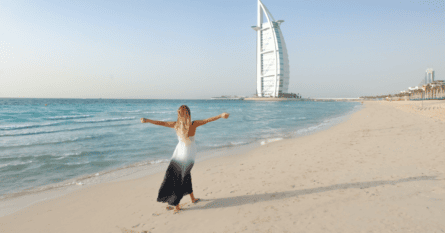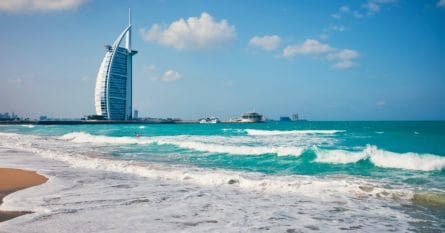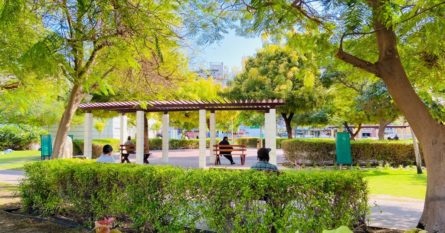Estimated reading time: 7 minutes
Are you planning to visit Dubai during Ramadan and looking to experience the city’s vibrant atmosphere while taking into account important regulations and considerations? Our comprehensive guide has got you covered!

Dubai is a melting pot of diverse cultures and traditions, and as a Muslim city, Ramadan is one of the most important cultural and religious events there. For visitors to Dubai, experiencing the city during Ramadan can be a unique and fascinating experience. The beautiful decorations, traditional food scene, vibrant night markets, and prayer gatherings offer a glimpse into the rich heritage and hospitality of the Emirati people. In this article, we’ve gathered everything you need to know to fully enjoy this special time.
A brief history of Ramadan and its cultural role
Ramadan is the 9th month of the lunar calendar that begins with the sighting of the new crescent moon and lasts for either 29 or 30 days, depending on the next crescent sighting. Hence, the exact dates of Ramadan change every year. During this month, Muslims who are able to do so must fast from dawn until dusk, refraining from food and drink.
In the UAE, Ramadan traditions start in mid-Shaaban, the month before Ramadan, on a day called Hagg Al-Layla. Children wear their finest clothes and go to their neighbors’ homes to sing songs and recite poems. The neighbors welcome them with sweets and nuts, which the children collect in traditional cloth bags.
On the first night of Ramadan, families in the UAE typically gather together (usually at the home of their elder family members) for their first Iftar meal. This is not only a religious occasion, but also a festive time for families to strengthen their bonds.
Another way that the joy and spirit of togetherness during Ramadan is expressed is through decorations. Hanging lanterns, crescent moons, stars, and colorful fabrics with red patterns are among the main elements of these adornments. You can see beautiful decorations everywhere you go, from shopping malls and restaurants to hotels and parks. People decorate their house in gold and red themes to create a warm and inviting atmosphere. With so much emphasis on Ramadan celebrations, many brands offer innovative products and collections each year that are specifically designed for the occasion. These include home accessories, party supplies, jewelry, dresses, perfumes, and even special Ramadan-themed cakes and sweets.
Iftar Ceremony
Iftar is the fast-breaking evening meal at sunset and is one of the most anticipated parts of the day during Ramadan. It is a time when family and friends come together to break their fast and enjoy a meal after a day of fasting. Iftar is not just about satisfying hunger, but it is also a time of celebration, reflection, and community.
Muslims traditionally break their fast with dates and either water or a yogurt drink. After that, they pause for the night (Maghrib) prayer. Following the prayer, a full-course meal is enjoyed, which typically includes a lavish spread of Arabic dishes like Harees a delectable blend of mashed wheat often cooked with meat or chicken, Kibbeh, a savory mix of bulgur wheat and finely minced lamb, traditional Harira soup, and the all-time favorite Fattoush salad.

In Dubai, the tradition of Iftar is celebrated in a grand way. Huge tents are set up around the city, and lavish buffet feasts are on offer for everyone, regardless of whether or not they’re fasting Muslims. These tents offer a unique opportunity to experience local culture and cuisine.
In addition to the traditional tents, many restaurants in the city also offer fantastic Iftar deals after sunset. These deals usually feature a wide range of delicious Arabic dishes, including appetizers, sides, and desserts, all at special prices.
The Iftar ceremony in Dubai is also marked by a time-honored tradition – the firing of cannons (Midfa Al Iftar). This unique practice, dating back to the 1960s, serves as a signal that Muslims can break their fast and can be heard even from as far as 8-10 km away. Five cannons fire at different locations across the city, including Burj Park, Al Mankhool, Al Baraha, Madinat Jumeirah, and Dubai City Walk, creating a festive atmosphere and signaling the start of a communal meal. UAE military personnel carry out this tradition while ensuring the necessary safety precautions are in place.
Sales and special offers
Dubai shopping can be made even more enjoyable during Ramadan with exciting offers and deals. Many supermarkets provide significant discounts on essential commodities, which can ease financial stress during this month. Discounts can go as high as 70% off on a wide range of products, making it an excellent opportunity to stock up on necessities.
Aside from supermarkets, clothing stores, toy shops, and electronics outlets offer discounts as well, especially toward the end of the month which leads to Eid-Al-Fitr. Additionally, malls’ operating hours extend into midnight, allowing you to explore the diverse offerings and take advantage of Ramadan offers.
Nightlife in Dubai during Ramadan
Dubai’s nightlife during Ramadan might be quieter than usual, with no parties or nightclubs in operation, but that doesn’t mean the city goes to bed early. After sunset and the breaking of the fast, the city takes on a festive mood, and traditional night markets and shopping malls become the go-to destinations. Moreover, many attractions, such as the Burj Khalifa, extend their hours of operation, sometimes as late as 1 a.m., allowing visitors to enjoy their offerings beyond sunset.
Eating and drinking regulations during fasting hours
Over recent years, Dubai has undergone a significant change in its cultural practices during Ramadan. In the past, eating establishments were required to have licenses to operate during daylight hours and maintain blacked-out windows to ensure that the dining area was not visible to the public.
However, on April 11, 2021, the Dubai Department of Economic Development (Dubai Economy) issued a circular that relaxed these rules. According to the circular, restaurants across the emirate are no longer required to screen visible dining areas during fasting hours. This means that food courts, cafes, and restaurants – whether stand-alone or located in shopping malls, retail districts, or hotels – will be serving meals throughout the day.
While it is no longer illegal to eat or drink in public during Ramadan, it is advisable to respect local customs and traditions. These changes in the cultural practices of Dubai show the city’s ongoing commitment to creating a welcoming and inclusive environment for people from all cultures and backgrounds.
Eid-Al-Fitr in Dubai
The end of Ramadan is marked by the joyous celebration of Eid-Al-Fitr. Festivities and celebrations take place throughout the city, with bustling markets, mesmerizing fireworks, and feasting. Visitors can enjoy a host of exciting events, live entertainment, and fantastic discounts during this public holiday, making it a lively and vibrant time to be in Dubai.
Bonus tip
Remember Dubai streets can get crowded and congested in Ramadan, specially after sunset. Navigating the city can be challenging, especially if you are unfamiliar with the area. Which is why we advise that you book a Blacklane limousine service in Dubai to get you to your destination in style. When you download the Blacklane app, you’ll get access to local chauffeurs who know the best route to take. Your Blacklane chauffeur can also help you navigate some of the cultural and even infrastructural differences you’ll face on arrival.


